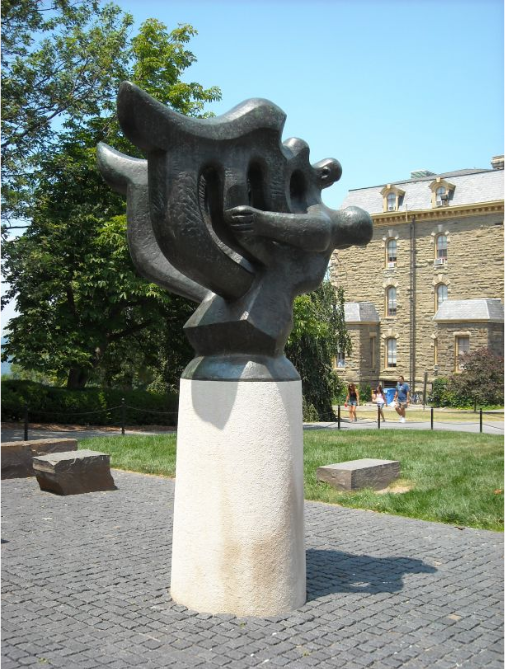
Olin Library
Olin’s collection of tangible materials, nearly 2,000,000 print volumes, 2,000,000 microforms, and 650,000 maps, comprises the University’s largest information resource. Students and scholars praise this collection for its depth and breadth, its completeness, its physical condition and its accessibility.
Researchers in the humanities and social sciences make growing use of digital tools, and scholarship in humanities and social sciences disciplines is increasingly disseminated electronically. While the Library’s collections continue to grow at a formidable rate, Olin’s patrons have worldwide access to an extensive collection of networked electronic resources. The thousands of journals to which the Cornell University Library subscribes in digital form include current and retrospective core titles in the social sciences and humanities.
Olin Library supports the teaching and research needs of the Cornell community by maintaining an intelligent balance of print and digital collections and through creative and flexible approaches to emerging technologies useful for selection and acquisition of print and digital materials. Even as conceptions of “collections” shift, Olin remains committed to long-term preservation of the scholarly record and stability of access in all formats, the historic mission of a research library.
Uris Library
Uris Library opened in 1891 as Cornell’s first library building. Designed by William Henry Miller, Cornell’s first student of architecture, in the Richardsonian Romansque style, the library garnered national acclaim for its combination of beauty and utility. The University Library, as it was known, was refurbished in 1962 with funds from Harold ’26 and Percy Uris, and was renamed in recognition of their generous contribution.
Uris also contains the A. D. White Library, a library within a library designed by Cornell’s first president, Andrew Dickson White, to hold his personal collection after he donated it to the university. It currently holds books on the history of the book and publishing. In an underground addition is the “Cocktail Lounge,” a unique 24-hour study area where contemporary design meets the Richardsonian Romanesque style.
Uris Library also houses the Cornell Library Collaborative Learning Computer Lab (CL)3, which supports collaborative computing and instruction for multimedia development, programming and game design.

History & Tours
Walking Tours
The Olin, Kroch & Uris Libraries Orientation Walking Tours, given at the start of each academic year, are designed to introduce new members of the Cornell community to the three libraries along the south side of Cornell’s Arts Quad at the heart of central campus. Together, those three libraries contain 3.5 million volumes—almost half of the Cornell University Library’s physical collections, and some of its most unusual and valuable books and manuscripts. These tours provide an introduction to the collections and guide you through the buildings so that you can make the most of the libraries and their services.
History & Virtual Tours
- Uris Library Historical Tour: This web tour and series of podcasts and videos brings Uris’s history to life and provides many details about Cornell’s oldest library and the attached McGraw Tower.
- Olin @ 50: This lively exhibition celebrates Olin Library’s history.
Artwork in Olin & Uris Libraries
Olin and Uris Libraries are home to numerous pieces of artwork, many of which relate to the history of the university.
Some of the more notable pieces include sculpture by Jacques Lipschitz (The Bather, 1923-25, in Olin Library, and Song of the Vowels, 1931, on the plaza between the two buildings), as well as portraits of the university’s presidents in the Uris Library Dean Room.
Art and artifacts on display in Olin and Uris Libraries may be searched online in the Cornell Campus Artifacts, Art & Memorabilia database.
